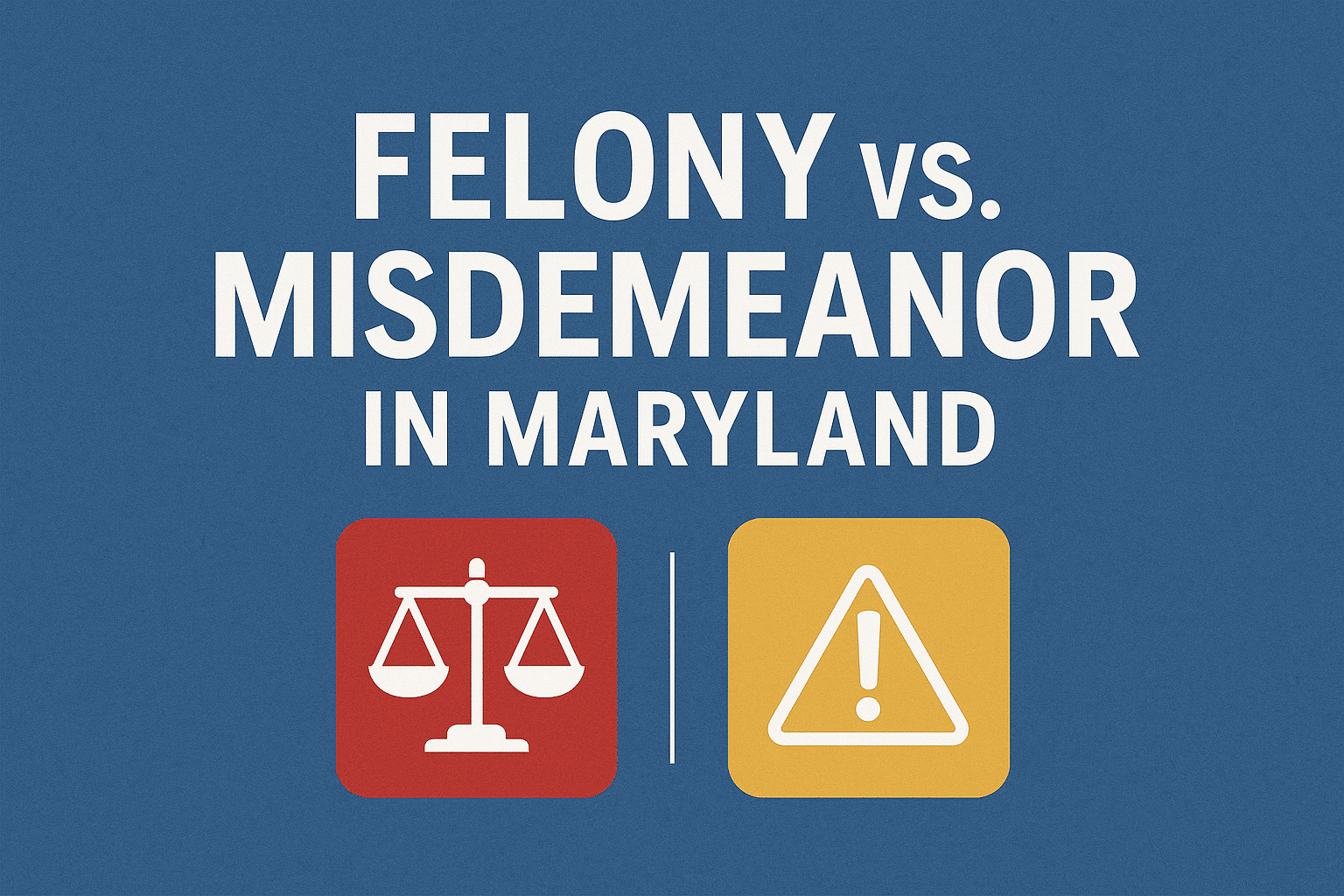
In Maryland’s criminal justice system, every charge is classified as either a felony or a misdemeanor—and the difference between the two can have a major impact on your future. Understanding the legal consequences, court procedures, and potential defenses for each type of offense is essential if you’ve been charged with a crime.
What Is the Difference Between a Felony and a Misdemeanor in Maryland?
The distinction between felonies and misdemeanors in Maryland is based primarily on the seriousness of the offense and the potential punishment. Unlike some other states, Maryland does not use a formal classification system like “Class A” or “Class B” felonies. Instead, each offense is defined by statute.
- Felonies are considered the most serious crimes. These often involve violence, large-scale theft, or threats to public safety. Examples include murder, rape, armed robbery, and drug trafficking. Felonies in Maryland can carry long-term prison sentences, sometimes up to life in prison.
- Misdemeanors are less serious but still carry significant consequences. These include offenses like DUI, second-degree assault, theft under $1,500, and disorderly conduct. Some misdemeanors can still result in up to 10 years in prison.
In some cases, the label “felony” or “misdemeanor” doesn’t predict the penalty. For example, misdemeanor theft in Maryland can carry a higher maximum sentence than certain felony drug possession charges.
Legal Consequences of a Felony vs. Misdemeanor in Maryland
The consequences of a conviction differ greatly depending on the classification:
| Category | Felony | Misdemeanor |
|---|---|---|
| Prison Time | Can exceed 1 year, up to life | Typically less than 1 year, but may be more |
| Court Venue | Usually heard in Circuit Court | Often handled in District Court |
| Collateral Impact | Loss of firearm rights, voting rights, immigration issues | May still affect employment, housing, and licenses |
In both cases, a conviction creates a criminal record, which can hurt future job opportunities and professional licensing.
Can a Misdemeanor Be Expunged in Maryland?
Yes—many misdemeanor convictions may qualify for expungement after a waiting period, assuming there are no other disqualifying conditions. Felonies are harder to expunge, though some non-violent felony offenses may qualify under certain laws, such as the Maryland Second Chance Act.
Is Second-Degree Assault a Felony or Misdemeanor?
In Maryland, second-degree assault is a misdemeanor, but it carries up to 10 years in prison and a $2,500 fine. The seriousness of the potential penalty shows how misleading the misdemeanor label can be. A skilled Southern Maryland criminal lawyer can help minimize or even beat these charges depending on the facts of the case.
How Are Felony and Misdemeanor Charges Handled in Court?
- Misdemeanors are usually filed in District Court and may be resolved quickly, especially for first-time offenders.
- Felonies typically start in District Court but are transferred to Circuit Court if the State proceeds by indictment or criminal information. Felony cases often involve pretrial motions, jury trials, and longer timelines.
Both types of cases carry risks, so it’s critical to have an experienced attorney evaluate the evidence, suppress illegal searches or confessions, and negotiate effectively with prosecutors.
Facing a Criminal Charge in Southern Maryland?
Whether you’re dealing with a misdemeanor or felony charge, the consequences can be life-altering. At Southern Maryland Criminal Defense, we provide aggressive representation tailored to your case and your goals. Don’t face the system alone—schedule a consultation today.
